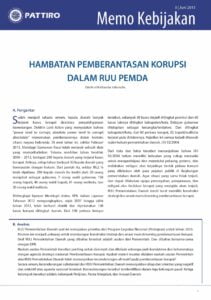 It is common knowledge that many regional heads have been caught in cases of corruption and/or abuse of authority. Lord Acton's doctrine which states that "power tends to corrupt, absolute power tends to corrupt absolutely" finds its justification in the context of the situation in Indonesia. At the beginning of this year, around February 2013, the Minister of Home Affairs, Gamawan Fauzi, released worrying data. During the last nine years, 2004 – 2012, there were 290 regional heads who were caught in corruption cases. This means that every year there are 32 regional heads who have problems with the law. Of that number, around 86.2% have been convicted. The 290 regional heads consist of: 20 people serving as governors, 7 deputy governors, 156 regents, 46 deputy regents, 41 mayors and 20 deputy mayors.
It is common knowledge that many regional heads have been caught in cases of corruption and/or abuse of authority. Lord Acton's doctrine which states that "power tends to corrupt, absolute power tends to corrupt absolutely" finds its justification in the context of the situation in Indonesia. At the beginning of this year, around February 2013, the Minister of Home Affairs, Gamawan Fauzi, released worrying data. During the last nine years, 2004 – 2012, there were 290 regional heads who were caught in corruption cases. This means that every year there are 32 regional heads who have problems with the law. Of that number, around 86.2% have been convicted. The 290 regional heads consist of: 20 people serving as governors, 7 deputy governors, 156 regents, 46 deputy regents, 41 mayors and 20 deputy mayors.
Complementing the Minister of Home Affairs report above, the Corruption Eradication Commission, in its 2012 Annual Report, revealed that from 2007 to the end of 2012, it had successfully investigated and prosecuted 138 cases of corruption at the regional level. Of the 138 corruption cases, 38 cases occurred at the provincial level and the other 60 cases at the district/city level. Eight governors were named as suspects/defendants. And at the district/city level, of the 60 corruption cases, 32 regents/mayors were also involved in them. These incidents all occurred under the regional government legal regime, Law 32/2004.
These data and facts show that Law 32/2004 does not have sufficient strength to anticipate and reduce opportunities, potential and mitigate the occurrence of criminal acts of corruption committed by public officials within regional government. So that a similar situation does not occur, and efforts can be made to prevent, monitor and mitigate acts of corruption that might occur, the Regional Government Bill must also have the construction of strategies and mainstream elements for eradicating corruption.
[__wpdm_package id='11659']
